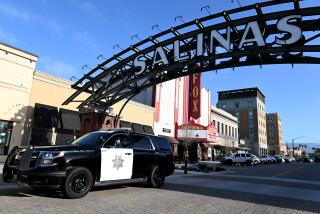‘Crusaders’ Loses Opportunity to Make a Difference
- Share via
The new crusade for “The Crusaders” became finding new jobs. Disney recently canceled its nationally syndicated advocacy news magazine show. Crusaders, producers, researchers and all the rest were cast adrift on a sea of television news already crowded with lifeboats.
For those of us who worked on “The Crusaders,” it became a dark Christmas for more than just financial reasons. At a time when broadcast news is besmirched as “tabloid” and “sensational,” this show reaped respect and affection from its audience. Once, when I told someone I worked for “The Crusaders,” the person said, “Oh! You’re with the good guys.”
The first day I went to work on the show if felt peculiar knowing I’d break the rules of neutral reporting, ingrained after so many years, and take on causes. But there was also an exhilaration. I was free to go after the bad guys, to push for better laws and to actually help those in need . . . without being phony.
“The Crusaders” did just that. My fellow journalists fixed things that were broken. Poor people got help. Ill children received medical attention. Exploited individuals got their money back. We got behind a state law and it passed.
*
So why did such a nice show get the sack?
“The Crusaders” was purchased by stations in about 140 markets. Several stations in medium-to-large markets invested in the show, giving it good time slots in the early evening and at times when the competition wasn’t overwhelming. In those cities “The Crusaders” had very strong ratings, even beating long-running tabloid news shows on rival stations. There was no doubt the show had significant appeal. But in many cities, stations never gave “The Crusaders” a chance. They buried their investment in programming Siberia, usually late at night, or occasionally opposite such ratings hulks as “60 Minutes.”
“The Crusaders” died because too many stations wouldn’t take the risk that a positive show would do better than old reliable sleazy, tabloid or celebrity-oriented fare.
Most of us who worked on the show will probably return to local, syndicated or network news and remember “The Crusaders” as a time when television journalism tried to be like it once was.
Black-and-white images come to mind of a producer interviewing a migrant farm worker. It was a 1961 CBS documentary that prompted changes in federal law and provided help to thousands of exploited and hungry farm workers.
I recall a chain-smoking Edward R. Murrow courageously exposing a corrupt U.S. senator and perhaps saving many more innocent people from having their careers and lives destroyed.
“The Crusaders” may not have achieved that sort of journalistic greatness, but in those cities where the show was given a chance, it proved that people craved a higher level of journalism. We showed that the topic doesn’t have to involve movie stars or murder. Television can make money doing well-produced, good journalism.
And isn’t that a far more satisfying choice?
More to Read
The complete guide to home viewing
Get Screen Gab for everything about the TV shows and streaming movies everyone’s talking about.
You may occasionally receive promotional content from the Los Angeles Times.






